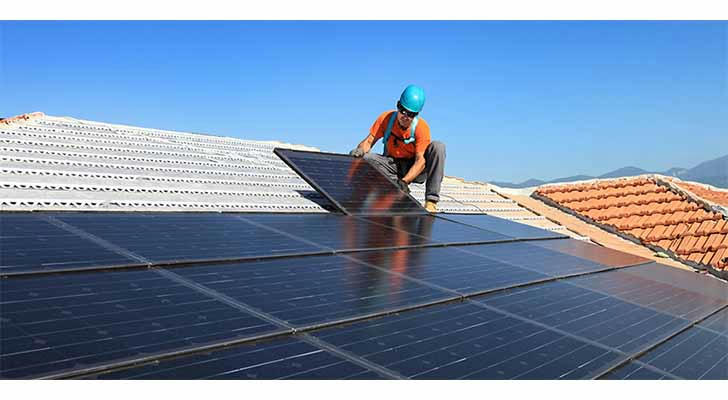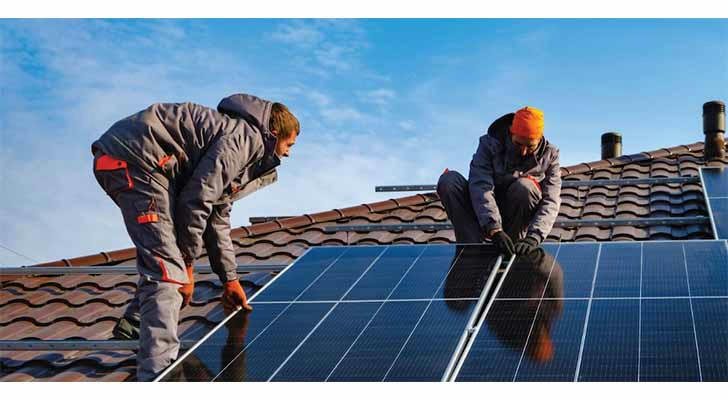Solar Panel Installers in the U.S.: A Bright Career for a Sustainable Future
The demand for solar energy is growing rapidly in the United States, driven by a desire for sustainable, cost-effective, and eco-friendly power sources. As the world shifts toward renewable energy, solar panel installers are playing a crucial role in shaping the future of energy consumption. These professionals are responsible for installing solar panels on residential, commercial, and industrial properties, contributing to the transition to cleaner energy. For individuals looking to enter a rapidly expanding field with long-term career potential, becoming a solar panel installer offers an exciting and meaningful opportunity.

Role and Responsibilities of Solar Panel Installers
Solar panel installers are responsible for the installation of photovoltaic (PV) systems that convert sunlight into electricity. The role involves a variety of tasks:
Site Assessment and Planning: Before installation, solar installers assess the location to determine the best positioning of panels. This involves evaluating the roof's structure, angle, and exposure to sunlight to ensure optimal energy production.
Mounting the Solar Panels: Installers secure the solar panels to the roof or another structure using brackets and mounts. They must ensure the panels are securely attached and correctly aligned to maximize efficiency and avoid damage.
Wiring and Electrical Connections: Once the panels are mounted, the installer connects the solar panels to the electrical system of the building. This includes wiring the panels to an inverter, which converts the direct current (DC) electricity generated by the panels into alternating current (AC) used by household appliances.
System Testing and Troubleshooting: After installation, the installer tests the system to ensure it is functioning correctly. If issues arise, they troubleshoot and make adjustments to optimize the performance of the solar array.
Maintenance and Repairs: Solar installers may also be called upon to maintain or repair solar systems, ensuring they continue to operate at peak efficiency. This includes cleaning panels, inspecting components, and replacing damaged parts.
Essential Skills and Qualifications
To be a successful solar panel installer, one needs a blend of technical skills, physical ability, and problem-solving capacity. Some essential qualifications include:
Technical Knowledge: Understanding how solar power systems work, as well as being familiar with the components involved, including panels, inverters, wiring, and batteries, is crucial for ensuring efficient installations.
Electrical Knowledge: Solar panel installers often need a solid understanding of electrical systems and wiring, as they connect the solar panels to a building’s electrical infrastructure.
Manual Dexterity and Physical Stamina: The work is physically demanding, often requiring installers to work at heights or lift and move heavy solar panels. A good level of physical fitness is essential for safety and efficiency.
Attention to Detail: Proper placement of panels and accurate wiring are critical for ensuring the safety, performance, and longevity of the system.
Problem-Solving Skills: Installers must be able to quickly identify and resolve issues that arise during installation, such as faulty equipment or unforeseen obstacles at a job site.
Communication Skills: Installers frequently interact with customers to explain system functions, provide updates, and answer questions. Clear communication is key to ensuring customer satisfaction.

Education and Training
While a college degree is not required to become a solar panel installer, the profession typically involves a combination of training, education, and certification:
High School Diploma or Equivalent: Most solar panel installers begin with a high school diploma. Courses in subjects like physics, electrical engineering, and mathematics can be beneficial for developing the necessary foundation for the trade.
Training Programs: Many installers enter the field through vocational schools or community colleges offering specialized courses in solar technology, renewable energy, or electrical work. These programs teach key skills such as panel installation, electrical wiring, safety protocols, and system maintenance.
On-the-Job Training: Most solar installers start as apprentices or helpers, gaining hands-on experience working under the supervision of experienced professionals. During this time, they learn about installation techniques, safety standards, and troubleshooting.
Certifications: Although not always required, certifications can increase an installer’s credibility and marketability. The North American Board of Certified Energy Practitioners (NABCEP) offers certifications for solar installers, which are recognized across the industry and demonstrate expertise in solar technology. Certifications can lead to higher-paying jobs and more job opportunities.
Job Outlook and Salary
The solar energy industry is one of the fastest-growing sectors in the U.S. As more homeowners, businesses, and governments adopt renewable energy solutions, the demand for skilled solar panel installers continues to rise. According to the U.S. Bureau of Labor Statistics (BLS), the job outlook for solar panel installers is expected to grow by 27% from 2022 to 2032, much faster than the average for all occupations.
Salary: As of 2023, the median annual wage for solar panel installers is approximately $47,000, with higher salaries possible for those with experience, certifications, and specializations in certain systems. In some regions or for specialized projects, installers can earn $70,000 or more. In addition to salary, some employers may offer benefits such as healthcare, paid time off, and retirement plans.
Challenges and Opportunities in the Industry
While the profession offers excellent opportunities, it is not without its challenges:
Physical Demands: Installing solar panels is physically demanding work, often requiring installers to work in hot or cold conditions, on rooftops, or in awkward positions. It’s important for installers to maintain proper safety protocols to avoid injury.
Seasonal Fluctuations: In some regions, solar panel installation may be seasonal, with more installations occurring in spring and summer months. However, as the demand for solar energy grows, some areas see year-round work opportunities.
Weather Dependency: Inclement weather, such as rain, snow, or extreme heat, can delay installations or make outdoor work unsafe. Installers must be prepared for work stoppages due to weather conditions.
Despite these challenges, the solar energy industry presents numerous opportunities:
Growing Demand for Renewable Energy: As global concerns about climate change continue to rise, there is an increasing emphasis on transitioning to renewable energy sources. Solar panel installers play a key role in this transition, ensuring the widespread adoption of clean energy solutions.
Technological Advancements: The rapid development of new solar technologies, such as more efficient solar panels, energy storage systems, and smart-grid integration, offers opportunities for installers to stay on the cutting edge of the industry and improve their skills.
Job Security and Career Growth: With a growing demand for solar energy and the need for a skilled workforce, solar panel installers can expect job stability and opportunities for advancement. Many installers go on to become project managers, system designers, or even start their own solar installation companies.

Emerging Trends in Solar Installation
The solar energy industry is continuously evolving, with several key trends influencing the profession:
Energy Storage: With the development of advanced battery technologies, more solar installations are incorporating energy storage systems, allowing homeowners and businesses to store excess energy for use during cloudy days or at night.
Solar Roofs and Integrated Systems: New technologies are making solar energy more seamless and aesthetically pleasing. Solar roof tiles, for example, integrate into the roofing material, eliminating the need for traditional panels and creating a more streamlined appearance.
Smart Grid and IoT: As solar systems become more interconnected with smart home technologies, installers may need to integrate solar systems with Internet of Things (IoT) devices, enabling users to monitor energy consumption and adjust settings remotely.
Community Solar Projects: In areas where rooftop installations are not feasible, community solar projects are gaining traction. These projects allow multiple households or businesses to share energy produced by a single solar farm, expanding access to solar power.
Conclusion
Solar panel installation is an essential and rewarding profession that is integral to the transition to a greener, more sustainable energy future. With strong demand, the opportunity to work with cutting-edge technology, and the ability to make a tangible impact on the environment, becoming a solar panel installer offers numerous benefits for those looking for a stable and meaningful career.
As the solar energy market continues to grow, so will the need for skilled installers. By obtaining the right training, certifications, and staying current with industry trends, solar panel installers can ensure a successful career with opportunities for advancement and specialization in this rapidly expanding field.
